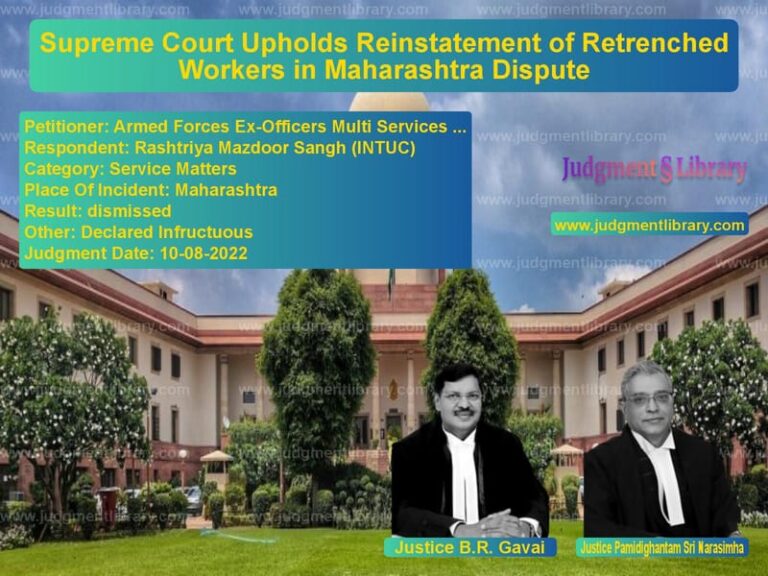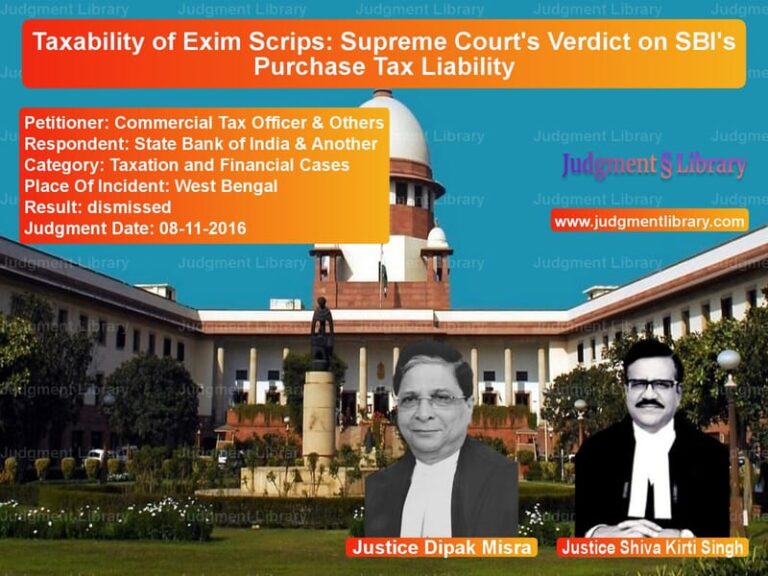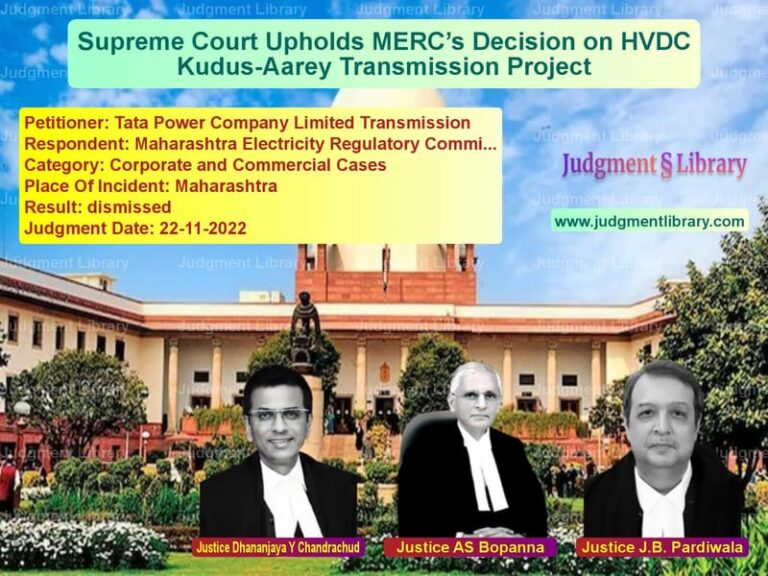Motor Accident Compensation Enhancement: A Case of Amputation and Future Economic Loss
The present appeal arises from a judgment passed by the High Court of Punjab & Haryana at Chandigarh in the case involving Ramesh, the appellant, and Karan Singh & Anr., the respondents. The appeal stems from a vehicular accident that occurred on January 2, 1997, which resulted in the amputation of the appellant’s right upper limb below the elbow. The appellant approached the Motor Accident Claims Tribunal seeking compensation for the injuries sustained, and while the Tribunal awarded a compensation of Rs. 6,68,000, the appellant was dissatisfied with the amount and subsequently approached the High Court. The High Court partially allowed the appeal, enhancing the compensation to Rs. 14,82,000. Feeling aggrieved by the enhancement of compensation, the appellant has now approached the Supreme Court for further relief.
The appellant, at the time of the accident, was employed in the Merchant Navy, earning USD 1000 per month excluding free food, accommodation, and air tickets. The appellant sustained serious injuries, including the amputation of the right upper limb, which resulted in a 70% disability of the right arm. The case before the Tribunal involved claims for compensation under various heads, including pain, suffering, medical expenses, and future economic loss.
The Tribunal awarded a compensation sum of Rs. 6,68,000, but during the appeal in the High Court, the amount was increased to Rs. 14,82,000. However, the appellant contended that the compensation awarded was still insufficient, especially in light of the serious nature of the injuries sustained and the loss of income due to the disability. The Supreme Court, while deliberating upon the appeal, considered the adequacy of the compensation granted by the High Court and the factors surrounding the future economic loss and the pain and suffering endured by the appellant.
Read also: https://judgmentlibrary.com/supreme-court-enhances-compensation-for-road-accident-victim/
The primary issue before the Supreme Court was whether the compensation awarded by the High Court was adequate in view of the appellant’s employment situation in the Merchant Navy and the permanent disability caused by the accident. The appellant’s future economic loss was particularly contentious, as the High Court had considered his income at Rs. 36,000 per month but had reduced the loss to 50% of this income on the ground that jobs in the Merchant Navy are typically for six months a year.
Petitioner’s Argument
Mr. Ramesh, the appellant, through his counsel, argued that the High Court had erred in determining the future economic loss. The appellant’s salary at the time of the accident was USD 1000 per month, which, when converted to Indian Rupees, was substantially higher than the figure of Rs. 36,000 per month considered by the High Court. The appellant pointed out that the nature of the job in the Merchant Navy is such that while it might require long periods away from home, the salary and benefits associated with the job should be fully considered in calculating the future loss of income.
The appellant further argued that the High Court’s observation that jobs in the Merchant Navy are typically for six months per year was baseless and lacked evidential support. The appellant’s disability, which resulted in the amputation of his right upper limb, had rendered him incapable of performing any duties related to his previous occupation in the Merchant Navy. The appellant also contended that the compensation for pain, suffering, and shock was woefully inadequate given the severity of the injuries sustained and the multiple operations required.
Respondent’s Argument
The respondents, represented by Karan Singh, argued that the High Court had rightly considered the appellant’s future economic loss based on a reasonable assumption that the appellant’s income was not consistent throughout the year. The respondents contended that in the Merchant Navy, employment is typically seasonal, and the appellant would not have earned income for the entire year. Therefore, the High Court’s decision to reduce the compensation based on 50% of the appellant’s income was appropriate.
The respondents also emphasized that the medical evidence indicated that the appellant’s disability was restricted to his right arm, and despite the amputation, the appellant could still engage in some form of work, albeit with reduced capacity. As for the compensation for pain, suffering, and shock, the respondents maintained that the High Court had considered all relevant factors and had awarded an appropriate amount based on the nature of the injuries.
Court’s Analysis and Ruling
The Supreme Court critically examined the arguments presented by both parties and reviewed the compensation awarded by the High Court. The Court noted that the appellant had sustained a permanent disability and had undergone five surgeries as part of the prolonged treatment. The Court also observed that the High Court had wrongly assumed that the appellant could still earn an income in the Merchant Navy despite his disability, which was a significant oversight in the case.
The Court further examined the issue of future economic loss. It found that the High Court’s assumption of a 50% income reduction was not based on any concrete evidence or proper reasoning. The Court ruled that the appellant should have been compensated based on a full salary, especially considering the nature of the appellant’s job and the permanent disability caused by the accident. The Court, therefore, recalculated the future economic loss and determined that the appellant should have been compensated at a higher rate, with the total amount of compensation increasing accordingly.
The Court also addressed the compensation for pain, suffering, and shock, noting that the amount awarded by the High Court was too low given the nature of the injuries and the prolonged medical treatment required. The Court increased the compensation for pain and suffering to Rs. 4,00,000, recognizing the severity of the appellant’s physical and emotional trauma.
Finally, the Supreme Court modified the High Court’s decision and awarded the appellant a total sum of Rs. 62,35,000 as compensation, along with 7.5% interest per annum from the date of filing the claim petition until realization. The Court further directed that the enhanced compensation be deposited by the respondents with the Tribunal within eight weeks and be paid to the appellant through an account payee cheque.
Conclusion
The Supreme Court’s ruling in this case highlights the importance of ensuring that victims of motor vehicle accidents receive adequate compensation for both their economic loss and the pain and suffering they endure. The Court’s decision to enhance the compensation reflects a more thorough consideration of the appellant’s income, disability, and the permanent impact of the accident on his life. This judgment sets an important precedent for how future claims for compensation in similar cases should be evaluated and addressed.
Petitioner Name: Ramesh.Respondent Name: Karan Singh & Anr..Judgment By: Justice M.R. Shah, Justice Krishna Murari.Place Of Incident: India.Judgment Date: 16-09-2022.
Don’t miss out on the full details! Download the complete judgment in PDF format below and gain valuable insights instantly!
Download Judgment: ramesh-vs-karan-singh-&-anr.-supreme-court-of-india-judgment-dated-16-09-2022.pdf
Directly Download Judgment: Directly download this Judgment
See all petitions in Compensation Disputes
See all petitions in Negligence Claims
See all petitions in Worksite Accidents
See all petitions in Judgment by Mukeshkumar Rasikbhai Shah
See all petitions in Judgment by Krishna Murari
See all petitions in partly allowed
See all petitions in supreme court of India judgments September 2022
See all petitions in 2022 judgments
See all posts in Accident Cases Category
See all allowed petitions in Accident Cases Category
See all Dismissed petitions in Accident Cases Category
See all partially allowed petitions in Accident Cases Category







